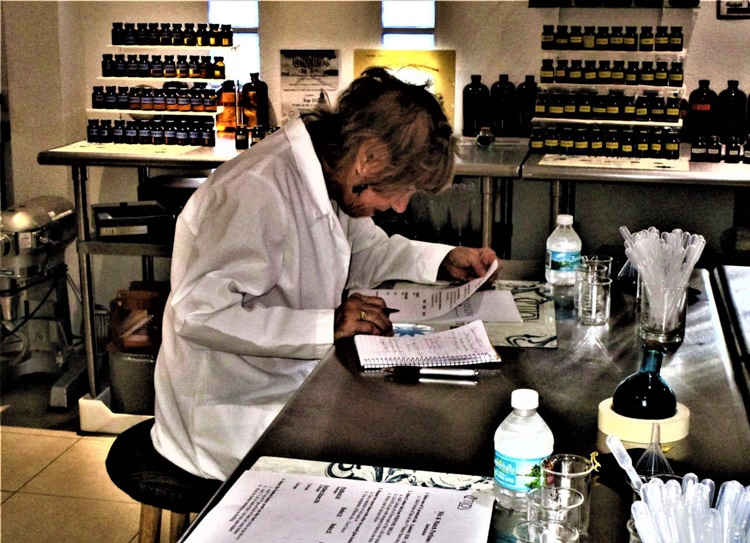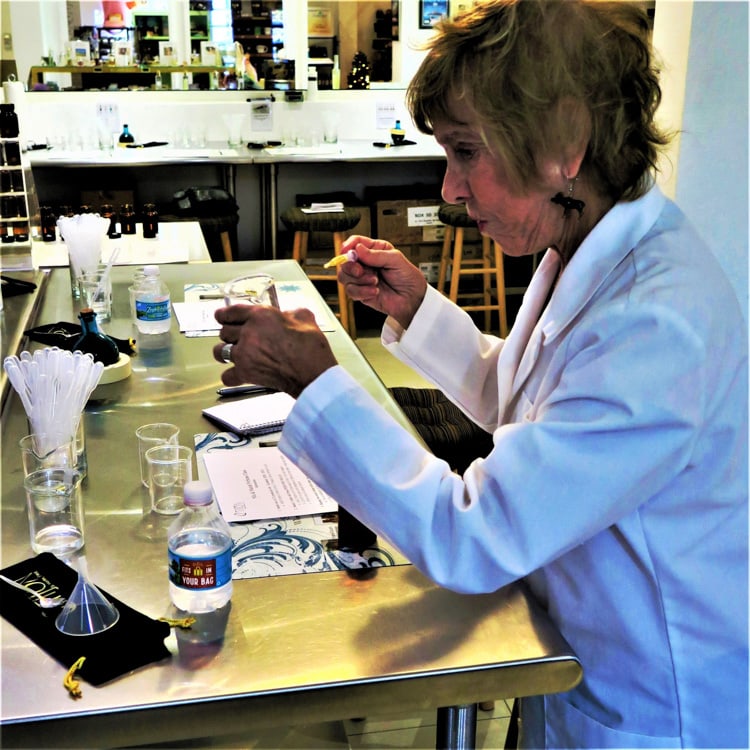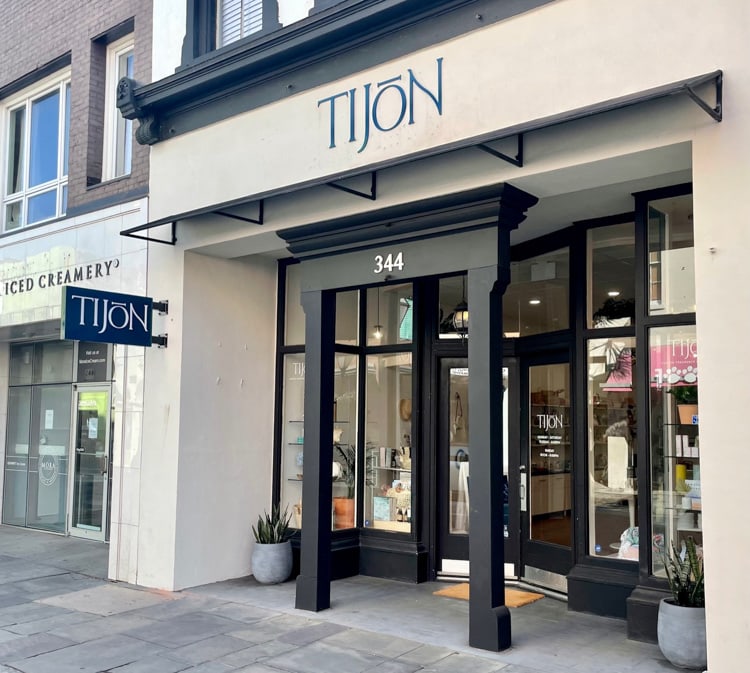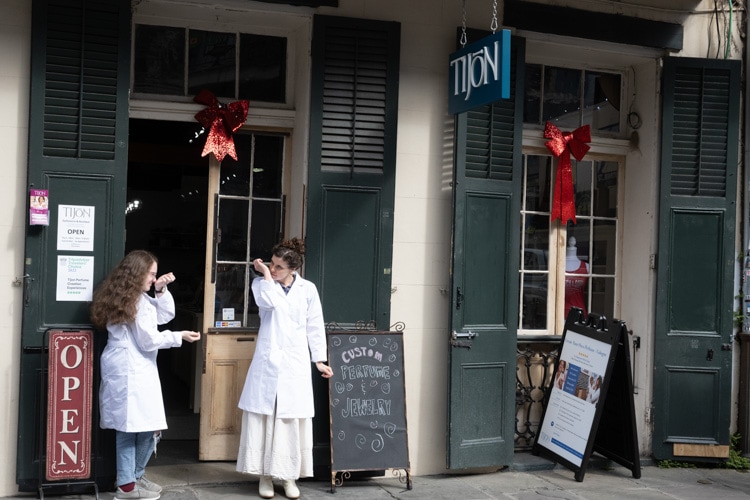
So there I was in my white lab coat, examining the 40 different vials and trying to determine which combinations to mix to get the best outcome. Admittedly, I wasn’t enacting some important scientific discovery or creating a medical breakthrough, but it felt almost that significant.
What if I screwed up, made ridiculous choices as to the most effective ingredients, and came away with an awful-smelling product? Yup, I was making perfume at the Tijon Parfumerie & Boutique on the French side (obviously!) of the Caribbean island of St. Martin.
First, some background. The Parfumerie itself is a study in sensory overload—a cologne colony. There are over 300 individual oils to choose from. Of course, a little history is imparted before you’re let loose to create your own personal perfume. As an amateur “nose”—someone who uses oils to create new fragrances—you learn that heat, humidity and sunlight are the enemies of perfumes. There are natural essential oils and man-made fragrances. You must combine top notes, middle notes and base notes to fashion “an accord” that will constitute a pleasing perfume.
Tijon Parfumerie—Wherever You Exerience It—Is a Fun and Exciting Experience Experience Unlike Any Other

Becoming a chemist is no easy task. There are a whole series of intricate steps to follow in the search for perfection. First, you choose three bottles from a series of 12 pre-mixed oils sporting such descriptions as “warm, exotic, rich earthy base,” “tropical, citrus blend,” or a “soft, floral base.” Then you select nine other oils—for three perfume creations—from a selection of a mere 300. I randomly, because really, how else can you do it?, chose Beach, Cashmere, Grass, April Rain, Vanilla Oak, Sunflower, Amber Musk, Aqua Spa and Rose. After a while, I didn’t know whether to eat the flavors, bathe in them or plant them in a garden.

And then, using beakers and droppers—because yes, this IS a lab experiment—you yourself choose how to combine the different options of all the fragrances into three potential bottles of perfume. Once you determine which of the final prospects you like the best, you add a number of other chemical properties to solidify the perfume-making process so that your own personal perfume can be beautifully bottled and placed in a classy cloth carrying case.
And of course, it all ends with a champagne toast because, remember, you’re still in France. Voila! You are a perfume maker. And every time you use the perfume, which, by the way, you have also named so that it is intrinsically yours, you will remember St. Martin.
St. Martin’s Tijon Parfumerie Recently Opened in Charleston, SC and New Orleans, LA
Now you can also remember New Orleans, Louisiana, for something more than jazz and Charleston, South Carolina for other than its Low Country Cuisine. Tijon Parfumerie has expanded into those cities, one scent-making miracle at a time. Owner John Berglund first chose these two locations because of their French connections— historically part of a Caribbean trade route and currently both actually have French Quarters, though the Big Easy’s may be a tad more well known. And they each attract lots of tourists.
The three friends who now own the Charleston franchise came by way of St. Martin. Ben Davis, one of the partners, describes it: “I left Tijon St. Martin feeling like I had made the best perfume there ever was. I want to share that feeling with our customers in Charleston!” Which he and his friends have now been doing since July 2021.The New Orleans franchisees have a similar story.

St. Martin’s Tijon Parfumeries Adopts Its Fragrances to Its New Locations in the States
In order to adapt the fragrances to their new locations, John tweaked the recipes to create a signature unisex fragrance collection for each location. For Charleston, he created three various samples, trying to incorporate local flowers and materials and provided them with names that had connections to the area: Pink House, Indigo Row and Verdigris. The first refers to the oldest residential house in Charleston and the other two to an historically popular plant and paint color.
In New Orleans, he created a collection of four unisex fragrances, again trying to incorporate local flowers and materials, and gave them local names that resonated with their location: Vieux Carre, Flambeaux, Fleur de Lis and Croquere. Croquere, he explains, “was a mulotto master swordsman of the early 19th century who fought many duels, was a dueling instructor, and was called by many as the most handsome man in New Orleans.” Now? He’s been reduced to “a popular herbaceous New Orleans blend of soft citrus, warm woods and leather with Cajun spice undertones to create a rich, sensual, and harmonious scent.” I’m sure he’d be proud to be a perfume.

Already, Tijon’s new locations are enjoying the smell—or more appropriately, the many smells—of sweet success, so more U.S. cities are likely to be added soon. Says Berglund: “We are looking forward to expanding to other cities to share these very special perfume experiences and have begun conversations with potential franchisees, most of whom have already experienced Tijon as a customer.” As a customer myself, I’m excited for those cities.
If You Go:
For more information, visit tijon.com, tijon.com/nola and Charleston.tijon.com.
